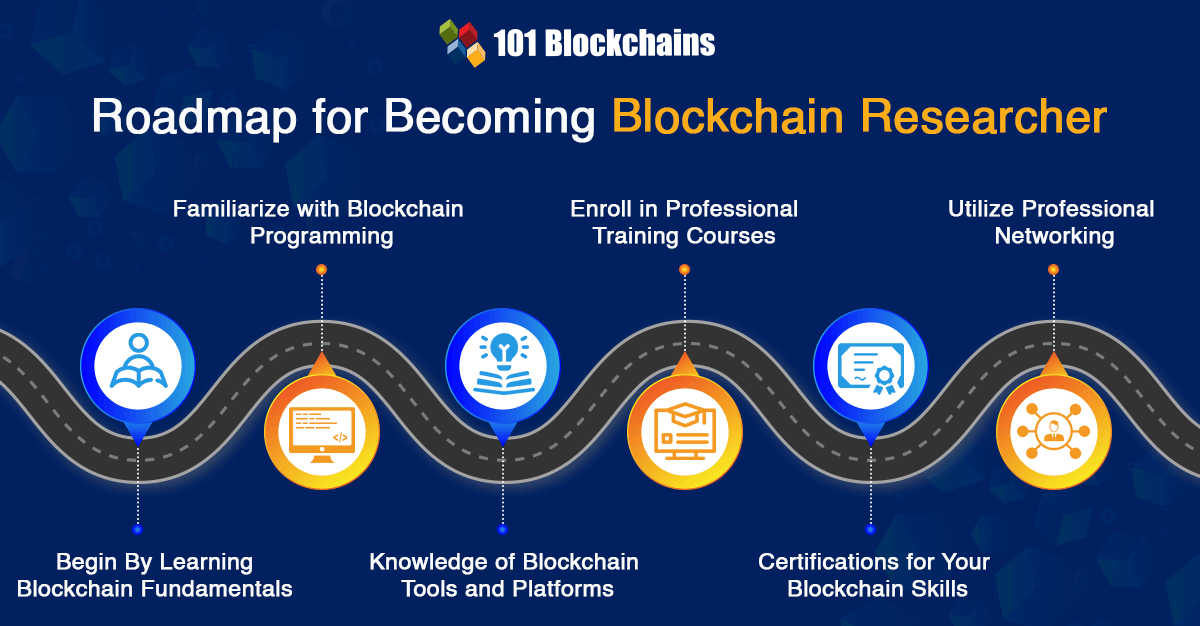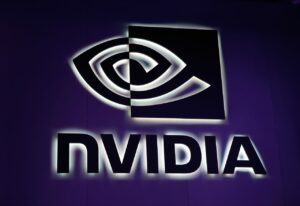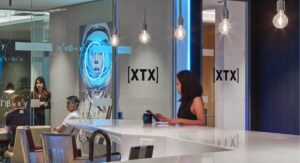The introduction of new technologies has always caught the attention of job markets worldwide. For example, the arrival of internet introduced many new job roles, which created new opportunities for employment. The sporadic growth of blockchain technology has sparked a similar phenomenon, with prospects to become blockchain researcher, developer, or a consultant. Blockchain researchers, blockchain research analysts, or blockchain analysts are essential requirements for the workforce in different industries. Starting from finance to education and healthcare, blockchain researchers can serve a broad range of use cases. The continuous growth of blockchain industry has fuelled the demand for blockchain researchers and many other career opportunities. However, beginners are likely to end up with lots of doubts about beginning their blockchain career as a blockchain researcher.
The challenges of learning blockchain technology and improving practical expertise can create multiple setbacks for aspiring professionals. However, the average blockchain researcher salary can serve as the motivation required to overcome initial apprehensions. For example, blockchain researchers could earn over $60,000 for entry-level roles. Let us find out the essential information you need to become a blockchain research analyst or blockchain researcher.
Build your identity as a certified blockchain expert with 101 Blockchains’ Blockchain Certifications designed to provide enhanced career prospects.
What is a Blockchain Researcher?
The first thing you need before pursuing any role in the blockchain ecosystem is an understanding of the role itself. Blockchain research or blockchain research analysis is one of the most promising options for careers in blockchain with multiple benefits. Blockchain research analysts are professionals who study blockchain networks to identify important patterns and trends. The blockchain researcher also implements research on the potential applications of blockchain technology.
In addition, blockchain researchers also work on development of new blockchain applications and provide insights for improving existing applications. Blockchain researchers could play a crucial role in evaluating the effectiveness and limitations of blockchain technology for businesses. Most important of all, blockchain analysts could also help companies identify the best ways to integrate blockchain technology into their business. Blockchain research analysts also help in identifying potential security risks in adoption of blockchain technology for an organization.
Responsibilities of Blockchain Researchers
The most popular techniques to prepare for blockchain jobs emphasize the necessity of learning about the job roles and responsibilities. What would you do as a blockchain researcher? The detailed outline of blockchain researcher roles and responsibilities could help you identify the skills required for addressing the responsibilities. Here is an outline of the responsibilities of blockchain researchers.
- Conducting in-depth research on the blockchain technology foundation, DeFi solutions, and dApps for a business.
- Analysis of the outcomes of research on blockchain technology and its functionalities.
- Collection of data required for research and analyzing results with the help of statistical techniques for providing continuous reports.
- Management of databases, data analytics, and data collection systems alongside other strategies for optimizing statistical quality and efficiency.
- The responsibilities of professionals in blockchain researcher jobs also focus on identification, analysis, and interpretation of patterns and trends in complex datasets.
- Blockchain researchers have to identify and evaluate the opportunities for new process improvements.
- Information retrieval from primary and secondary sources for maintaining the databases or data collection systems.
- Reviewing the new trends in blockchain for identifying unique opportunities to deploy capital.
- Reflecting on the possibilities associated with cryptocurrencies, GameFi, metaverse, DeFi, and layer 1 and layer 2 blockchains alongside other important verticals.
Are you ready to take your career to the next level? Join our Premium plan now and get access to exclusive Web3 & Blockchain Job listings on 101 Blockchains.
Skills Required to Become Blockchain Researcher
The promising career prospects for blockchain researchers are strong reasons for choosing career paths in blockchain research. At the same time, it is also important to think of the efforts required to prepare for addressing the responsibilities of blockchain researchers. You can find reliable answers to “How do I become a blockchain researcher?” with a detailed outline of skill requirements. It is important to identify the skills required for blockchain research analysts to achieve desired business objectives of your employers.
Blockchain researchers must have specific academic qualifications and technical skills alongside business skills. For example, candidates aspiring for blockchain researcher roles must have a Bachelor’s or Master’s degree in mathematics, statistics, computer science, or economics. Interestingly, your academic qualification could not be a barrier to achieving your dreams of becoming a blockchain researcher. Here is an outline of the notable skills required to become a blockchain researcher.
- In-depth understanding of blockchain technology, distributed architecture, and computer science fundamentals.
- Experience in designing and implementing distributed systems, such as layer 1 blockchains, dApps, or DeFi solutions.
- Fluency in English for writing, reading, and verbal communication for specialized technical documents.
- The most important skill required to become blockchain researcher is your dedication and belief in the future of blockchain and web3 technologies.
- Command over analytical skills with abilities for collection, organization, analysis, and dissemination of large amounts of information. At the same time, you also need to pay special attention to accuracy and details of data.
- Blockchain researchers also need skills in using analytics tools, such as Google Analytics.
- Experience in working with data mining and segmentation techniques, data models, and development of database designs.
- Fluency in using data visualization tools alongside recommending ideal data analytics tools.
- Ability to work with teams while adapting to changing conditions in the workplace environment.
Start learning Blockchain with World’s first Blockchain Skill Paths with quality resources tailored by industry experts Now!
Roadmap for Becoming Blockchain Researcher
The job of blockchain researchers extends beyond reading and identifying important patterns in data about the blockchain market and new solutions. Candidates could look up to the blockchain researcher salary estimate as one of the reasons for pursuing a blockchain researcher career path. However, blockchain researchers could also enjoy other career advantages, such as the flexibility of working on diverse blockchain projects.
On top of it, blockchain researchers are a vital component in the emerging blockchain workforce. Blockchain researchers could guide the expansion of the blockchain and web3 landscape through accurate identification of opportunities and limitations. In addition, blockchain researchers could also uncover new ways to improve existing solutions in the domain of blockchain.
While blockchain researchers are an inseparable part of the blockchain community right now, it is important to note the difficulty of becoming one. You can become an eligible candidate for blockchain researcher jobs only with a broad set of skills. Blockchain researchers need more than the ability to use analytical tools or academic qualifications in mathematics, computer science, engineering, and statistics.
Therefore, aspiring blockchain researchers have to go through complicated efforts to achieve their dream roles. If you don’t want to put your efforts to waste, you need a well-defined roadmap for becoming a blockchain researcher. Here are the important steps you must follow to become a blockchain research analyst or a blockchain researcher.

-
Begin By Learning Blockchain Fundamentals
As a blockchain researcher, most of your work would involve terms and concepts related to blockchain technology. Therefore, the ideal course of action to prepare for careers in blockchain as a researcher would begin with blockchain fundamentals. You must understand the architecture of blockchain and the important terms such as blocks, consensus mechanisms, and nodes. At the same time, you must familiarize yourself with the different types of blockchains and their distinct traits.
For example, you should learn about the use cases of private, public, and hybrid blockchains. Another important highlight in the basics of blockchain for aspiring blockchain researchers is smart contracts. Blockchain researchers should know about the working of smart contracts and how they enable the applications of blockchain for different use cases.
Start your blockchain journey now with the Blockchains Fundamentals Free Course
-
Familiarize with Blockchain Programming
You might wonder about the necessity of blockchain programming in the job description of blockchain researchers. While blockchain researchers do not create new blockchain solutions, they help in improving existing solutions and provide recommendations for developing new blockchain applications.
Therefore, the responses to “How do I become a blockchain researcher?” focus on blockchain programming skills as one of the most essential requirements. Experience in blockchain programming helps blockchain researchers identify discrepancies in blockchain solutions with better efficiency and speed. You should learn about Solidity programming and the uses of JavaScript and Python for creating dApps.
The knowledge of blockchain programming could help researchers in multiple ways. For example, you can identify the code vulnerabilities which create performance issues. At the same time, you can also recommend the use of certain features and functionalities of programming languages for developing effective blockchain solutions.
-
Knowledge of Blockchain Tools and Platforms
The job of a blockchain researcher also requires comprehensive fluency in the working mechanisms of popular blockchain tools and platforms. Some of the most notable blockchain platforms and tools include Ethereum, Corda, Hyperledger, Remix, Truffle, Geth, and Hardhat.
In addition, you should also learn about other tools, such as node service providers, oracles, and bridges, which have emerged as vital parts of the blockchain ecosystem. The complexity of blockchain researcher roles and responsibilities requires fluency in all the tools used in the blockchain landscape.
How would the knowledge of blockchain tools and platforms help blockchain researchers? The comprehensive knowledge about functionalities of blockchain tools and platforms can help you discover the right solutions for organizations. For example, you can recommend Corda for developing private blockchain solutions for an organization.
-
Enroll in Professional Training Courses
Another mandatory recommendation for all candidates aspiring to become blockchain researcher is professional training. You would need professional training courses to understand blockchain technology from the perspective of industry experts. Blogs and articles on blockchain technology could offer a fundamental impression of blockchain architecture, its components, and use cases. Similarly, a review of the official documentation of blockchain tools and platforms could help you learn about their features.
Professional training courses on blockchain technology could empower you with knowledge about using blockchain tools and platforms. For example, a professional training course on smart contract development will introduce you not only to the working mechanisms of smart contracts but also to the steps in smart contract development. Furthermore, professional training courses also offer the benefits of learning from demonstrations and examples.
Upskill yourself with our world-class Web3 & Blockchain Training Courses on top technologies such as Metraverse, DeFi, and NFTs.
-
Certifications for Your Blockchain Skills
The next step in moving closer to blockchain researcher jobs of your choice involves blockchain certifications. You can become a blockchain research analyst only with wide-ranging expertise in blockchain technology. Therefore, you might need professional blockchain certifications to validate your practical knowledge of blockchain technology. Blockchain researchers with expertise in blockchain architecture or blockchain security are more likely to have a competitive advantage over other candidates.
In addition, it is important to look for professional certifications on NFTs, metaverse, and web3 to prove your knowledge of latest blockchain trends. The primary responsibility of blockchain researchers focuses on studying new trends and identifying the possibilities they bring for users. For example, your fluency in web3 can help in understanding the relationship between web3 and blockchain, metaverse, DeFi, and NFTs.
-
Utilize Professional Networking to Your Advantage
The best approach in your journey toward achieving the blockchain researcher salary you have dreamed of is professional networking. You must tell the world that you know the skills required to become a blockchain researcher. At the same time, you cannot rely on your certifications to go out on your own to employers. You should create an appealing portfolio with a detailed description of important qualifications, skills, and experience in real projects.
In the next step, you should participate in blockchain communities and professional networking forums for marketing your portfolio. Interact with other community members and tell them about your skills and experience in blockchain research. Surprisingly, you could end up meeting your future employer or partner for blockchain projects on such platforms.
Start learning Blockchain with World’s first Blockchain Career Paths with quality resources tailored by industry experts now!
Final Words
The roadmap for a blockchain researcher suggests simple steps for achieving the skills and experience required to become a blockchain researcher. You can find viable responses to “How do I become a blockchain researcher?” by starting with blockchain fundamentals. In the subsequent steps, you can work on improving your practical fluency in using blockchain tools and platforms.
At the same time, you should also familiarize yourself with the development and deployment of blockchain solutions. On top of it, you must remember the importance of knowledge regarding emerging trends such as NFTs, metaverse, and web3. Blockchain researchers play a vital role in transforming the blockchain landscape by offering recommendations for new solutions. Find the best resources to build your skills for becoming a blockchain researcher and make the most of emerging job opportunities now.

*Disclaimer: The article should not be taken as, and is not intended to provide any investment advice. Claims made in this article do not constitute investment advice and should not be taken as such. 101 Blockchains shall not be responsible for any loss sustained by any person who relies on this article. Do your own research!









